Commencement Speeches from Yesteryear
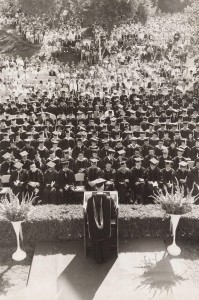
This week we are presenting a three-part series highlighting the history of graduation at the University of Oregon. Part one (Tuesday) takes a look back at commencement ceremonies from the the 19th century, part two (Wednesday) features a recent donation of graduation memorabilia from the turn of the century, and part three (Thursday) highlights commencement speeches over the years. Congratulations to the Class of 2015!!
One ubiquitous constant that has graced graduation weekend at the University of Oregon for over a century are the sage words of commencement speakers. These speeches offer both a window into a specific period of university history as well as eternal wisdom for present generations of graduates. Several collections in the University Archives house manuscript copies of student orations from the 19th and early 20th centuries, as well as those of guest speakers from the 1970s and 1980s. As the 138th commencement weekend approaches we have highlighted some excerpts from various UO graduation addresses of yesteryear whose messages remain relevant in 2015.
“Learning without honest and good government is a mere whitened sepulchre. And such government while our towns and cities, the nerve centers of the body politic, are under the control of the ignorance, poverty and vice that inhabit them, or of those who use and abuse them, is simply impossible. The danger is no longer indefinite nor in the distance. The virus of municipal corruption and mismanagement is steadily extending to the affairs of the state and nation.”
— Matthew P. Deady, U.S. district judge and Board of Regents member (1886 commencement, June 17, 1886)
“America, beware how you interpret your responsibility in the world’s affairs. Massive armies and navies are but the hollow show, the glittering tinsel of empire. Your power lies far deeper. So long as your moral current is clear and pure, your means of defense will not be lacking nor will your defenders be unprepared. If you yourself pollute the stream of your life blood, may a merciful Heaven turn from you the consequences of your folly.”
— Charles V. Galloway, student speaker for Class of 1899 (1899 commencement, June 15, 1899)
“The difficulty in carrying out the present day ideals is vastly increased by the complications of modern life. Behind the ferment in the industrial world lies the social problem. Instead of true social unity, fearless and consecrated leadership, we have, too often, the restless and clamoring masses, the grasping money-getter, the dishonest politician… The highest service the world over is the general welfare. There can be no true service, no independent greatness which does not spring from the heart of common humanity. We must apply this spirit to our industrial problems if we hope to have industry without sordidness. ‘Money is not everything.’ But no people have ever been so wrapped in it as are the people of this country today.”
— Ray Goodrich, student speaker for Class of 1904 (1904 commencement, May 31, 1904)
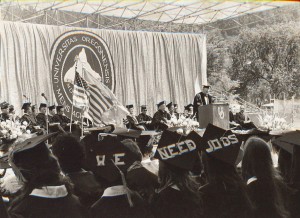
“You cannot waste and despoil the countryside for a century or more and remove all the ugliness that results with the stroke of a Presidential pen. I have heard serious student of the problem estimate that undoing the damage of the past century will cost perhaps ten percent of our gross national product for more years than any of us would dare to count… That daunting figure — bigger than our swollen military budget — will have to be paid in large part by the American people if they want the job done. The time is long past, it seems to me, when politicians can be allowed to get away with the patently false implication that somebody else will pay the bill.”
— Elie Abel, dean of Columbia University (1972 spring commencement, June 10, 1972)
“How often have we said ‘there ought to be a law’ to control someone else? How often have we said that the plight of some political conspiracy defendant did not concern us? How often have we felt that the use of illegal wiretaps for criminal or political fishing expeditions needn’t worry us because we are innocent? How innocent are we? how often have we held that ‘law and order’ is more desirable than loud disagreement? How often have we felt that someone who disagrees with us is a threat to our country? How often have we familiarized ourselves with the chains of bondage or accustomed to trample on the rights of others? Freedom, like the Bill of Rights, is not cast in concrete.”
— Forest W. Amdsen, owner of King Broadcasting Company (1972 summer commencement, August 12, 1972)
“All of you have had the opportunity to grow to maturity in a period when youth was getting a piece of the action, when social and political concern and involvement were the ‘in’ things, when the campaigns for racial and sexual equality, for environmental excellence, for consumer protection, for peace were sweeping across the country. And I can’t help but feel that these moments have influenced all of you. I hope these were not mere passing fancies or campus fads. I hope as you go out to establish families, get jobs, raise children, buy homes, you won’t fall into the self-absorbed attitudes that have plagued my generation.”
— Nancy M. Hayward, Lane County commissioner (1972 fall commencement, December 1972)
“The social responsibility to make improvements, advances, or to rebuild, is through a brick by brick effort masoned in the beginning by people of your capacity. However, regretfully, there does exist among too many Americans the fallacy that the ‘right person’ will appear, probably out of your ranks, and solve the problems in such areas as education, medicine, ecology, or government. (The last area, of late, may not foster such optimism.) For many of our non-degreed citizens, the university degree or post-graduate degree implies superhuman beings. With no intent to diminish your notable accomplishments, we know we still operate under the same emotions, duress, personality limitations and frustrations as all human beings… even though you have more training, you are little different than your fellow human beings, except you have a sheepskin.”
— Larry Perry, Oregon state representative (1973 summer commencement, August 11, 1973)
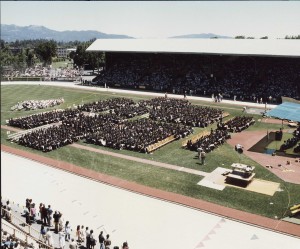
“Isn’t it amazing that with all the degrees that have been issued, with all the dramatic technological achievements we have made, that our society still finds itself armed with ignorance in the most fundamental struggles for survival? Perhaps the most profound discovery of the scientific world in the twentieth century has been the revelation of just how hard and fast we have been working to exterminate ourselves from the planet. Our problem today is that just as we have begun to become aware of our own peril, just as we have become a highly intelligent society, we have also become pseudo-sophisticated and pseudo-scientific. And, rather than face up to our problems and deal with them objectively, we choose instead to corrupt our language — our means of communicating intelligently — to the point where we delude ourselves and others into thinking our problems are being solved and we are safe.”
— Diarmuid F. O’Scannlain, director of Oregon Department of Environmental Quality (1973 fall commencement, December 7, 1973)
“There are limits to our capacity to exploit the earth’s resources and the application of technology to extend those limits will be increasingly costly in terms of the capital and labor which must be expended to produce an equivalent quantity of thermal units, kilowatts, and calories. The limits I am speaking of will not be broached by turning out the lights, driving VWs, or eating organic vegetables.”
— Gordon C. Bjork, president of Linfield College (1974 winter commencement, March 8, 1974)
“One of the recent social trends I fear most is a retreat to privatism — the abandonment, apparently out of futility, of civic and political involvement by talented people, young and old. It is as though we had forgotten the dual role of freedom in American history. Freedom was valued by the founders of this nation not merely as a means for personal self-realization, but as an essential element in the working of the government; political freedom was the means to attain the ‘consent of the governed.’ Appreciation for that role of freedom under law is an acquired, not an innate, virtue of society. So it is of enormous concern when a statistically large percentage of educated people affirmatively choose not to vote or to participate. It is saddening to hear the claim that no choice of theirs — even their own activism — makes a difference in the public life of this state or this nation.”
— David Frohnmayer, Oregon state representative and future UO president (1977 summer commencement, August 13, 1977)
“Clearly, the great American dreamscape is crowded with more varieties of dream than ever before. Are we as individuals and as a society strong enough, tolerant, intelligent, and fair enough to embrace and affirm multiple dreams?”
— Evelyn E. Handler, president of Brandeis University (1985 spring commencement, June 16, 1985)
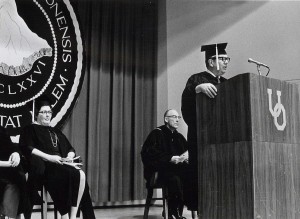
“How can we change the way we are? By working on it. Each of us can change the way we think and act. We can see a vision of a world where harmony and peace would be a reality, where love is as easily understood as power, and people are bound to each other, not detached. We can continue to be sensitive to ourselves, and yet put energy into empowering and helping others. We can recognize that we are all responsible to each other to solve our problems and create the world we desire. We are all members of the family of humankind, responsible for understanding, and caring for, others even if they are different from us. Only peaceful collaboration and cooperation is appropriate in resolving our differences and developing our potential. We must challenge policies and practices which hurt people, and work tirelessly for changes that will make it possible for people to be seen as more important than the power to control.”
— Margaret Nichols, superintendent of Eugene Public Schools (1986 summer commencement, August 16, 1986)
“Leadership is an essentially moral act, not — as in most management — an essentially protective act. Leadership is the moral courage to assert a vision of the institution in the future and to persuade the community or the culture of the wisdom and validity of the vision. It is to make the vision practicable, and compelling.”
— A. Bartlett Giamatti, commissioner of Major League Baseball (1987 spring commencement, June 14, 1987)
Information for this article was collected from the following sources:
- “Commencement Speeches,” University Archives alphabetical subject files, UA Ref 1, Box 5, Special Collections & University Archives, University of Oregon Libraries, Eugene, Oregon.
- “Commencement Addresses,” University Archives alphabetical single files, UA Ref 6, Box 4, Special Collections & University Archives, University of Oregon Libraries, Eugene, Oregon.
- Commencement records, UA 127, Special Collections & University Archives, University of Oregon Libraries, Eugene, Oregon.
- Matthew P. Deady, University of Oregon Commencement 1886 (Portland, OR: George H. Himes Publishing, 1886).
- Photos scanned from “Commencement” folders, University Archives photographs, UA Ref 3, Boxes 31 and 32, Special Collections & University Archives, University of Oregon Libraries, Eugene, Oregon.
Zach Bigalke
Student Research Assistant
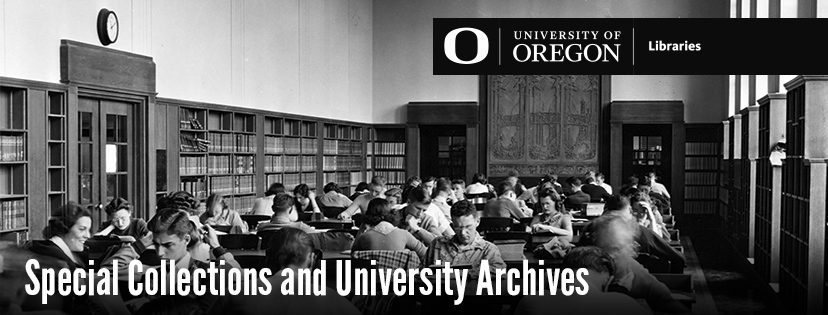

various UO graduation addresses of yesteryear 2015.. get to succsess !!
Nice post.. I really love your blogs
thank you for sharing,,,good job and keep you blog quality
Toko Pasutri